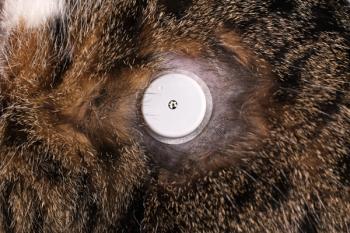
Veterinary studies suggest oxytocin fosters human-canine bond
Bonding hormone improves cue-taking ability in dogs, researchers assert.
Recently, two separate studies have argued that oxytocin, a hormone associated with maternal attachment and sexual bonding in people, enhances the relationship between people and dogs.
The research looked at the hormone's role in human-canine interactions and dogs' ability to understand cues from people. The results suggest that oxytocin plays a significant role in enabling deeper communication between dogs and owners and building their emotional connection.
Photo source: Getty Images
One study, conducted by researchers at Monash University in Melbourne, Australia, explored how intranasal administration of oxytocin affected the ability of 62 dogs to understand cues directing them to hidden treats. Forty-five minutes passed after the treatment to allow each substance to take effect. Each dog went through the cue-testing process with saline solution as well as oxytocin to provide researchers a control comparison.
Researchers hid lamb puff cubes inside one of two dog bowls, and a kneeling experimenter used two different cues in separate sessions to indicate the bowl containing the treat. After saying “OK” or something similar, she pointed for up to two seconds or gazed without moving her head. All the bowls smelled like the treats, and treats were placed around the room to eliminate the possibility of smell influencing the dogs' choices.
Dogs treated with oxytocin performed better with the pointing cue than when they were treated with saline solution. “This is consistent with findings for humans, demonstrating that oxytocin increases perception of biologically relevant human motion,” according to the study.1
Another study, conducted at Azabu University in Japan, examined the human-dog bond through urinary oxytocin concentrations. Using domestic dogs and hand-raised wolves, researchers had the owners gaze at the animals. Participants were placed into long- and short-gaze groups. Urine samples were taken from the animals and owners before the interactions and 30 minutes after the sessions.
Higher oxytocin concentrations were found in the dogs and owners belonging to the long-gaze group. The wolves didn't share mutual gazing with owners as much as the dogs did.
“Thus, dog-to-owner gaze as a form of social communication probably evolved during domestication and triggers oxytocin release in the owner, facilitating mutual interaction and affiliative communication,” according to the study.2
These results have implications for veterinarians. Armed with a better understanding of the owner-dog bond, practitioners can use the insight to navigate interactions with clients who have a close relationship with their dogs.
References
1. Olivia JL, Rault JL, Appleton B, Lill A. Oxytocin enhances the appropriate use of human social cues by the domestic dog (Canis familiaris) in an object choice task. Animal Cognition 2015;18:767-775.
2. Nagasawa M, Mitsui S, Shiori E, et al. Oxytocin-gaze positive loop and the coevolution of human-dog bonds. Science 2015;348(6232):333-336.
Newsletter
From exam room tips to practice management insights, get trusted veterinary news delivered straight to your inbox—subscribe to dvm360.






